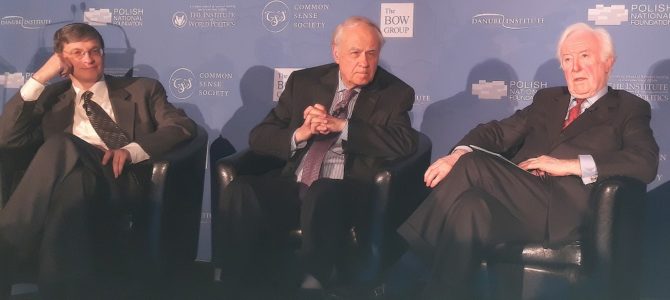
I talked with Dr. Yoram Hazony, the philosopher and author of the conservative bestseller, “The Virtue of Nationalism,” ahead of his book launch in London, prior to the Europe at a Crossroads conference. The conference featured some of the top conservative writers and philosophers, including Dr. John Fonte of the Hudson Institute, the author of the post-Trump national-conservative foreign policy, and Sir Roger Scruton.
Scruton called for something conservatives have been pondering on both sides of the pond for a while now: the abolition of universities in their current form, because they have turned into indoctrination chambers. The conference also tackled one of the biggest topics in front of Anglo-American grand strategy—the future of Europe, the European Union, and the coming rivalry between nation-states and a borderless marauding liberalism.
The conference came ahead of a crucial EU Parliament election, after a thorough betrayal of the biggest mandate in the history of British democracy by a prime minister whom a large section of the country perceives at best to be an incompetent imbecile, and at worst a traitor. Britain should have been out of the EU imperium by now. But as the latest BBC documentary shows, British Prime Minister Theresa May destroyed the negotiation from within.
The European Union, meanwhile, is not even pretending anymore, with Orwellian tweets that demonstrate how cultist the organization has become since it was formed to increase free trade and institutionalize peace within the continent. Meanwhile, a section of delusional American liberals, and even some conservatives still mentally living in the early 1990s, think the EU is a benevolent ally, despite all evidence to the contrary, from trade fines to military buck-passing. Yet the EU leaders are not even hiding their imperial ambitions.
“The world is developing into one not of nation-states, but of empires. China is an empire. India is an empire. The U.S. is an empire. We need to create a European Union that is capable of defending our interests,” said Guy Verhofstadt, the cantankerous leader of the liberal group of the EU Parliament. He supports further centralization.
The same sentiment is prevalent in Germany, the EU’s driving power. “Europe must reposition itself to stand up to the challenges posed by its three big global rivals, China, Russia and the U.S.,” The Guardian reported Angela Merkel saying before the elections.
So why do even otherwise sensible international relations theorists like Stephen Walt lament for the EU? It defies logic, as well as history. Under no circumstances can two hegemons coexist in one hemisphere, and the EU is slowly morphing into an imperial entity, with one parliament and one foreign policy. It might not have the same military power as the United States has, but does have enough trade power to throw its support behind China or Russia, unless divided.
I asked Hazony about that. According to Hazony, a future conflict between the EU and United States is almost inevitable. The EU is already a German-dominated empire, he said, but one that has cleverly managed to toss the continent’s entire security burden to American taxpayers, even when it has spent a record amount of 23 billion Euros on welfare for refugees.
Because American policymakers and taxpayers, either due to misguided optimism, delusion, or naivete, do not see what the EU is slowly morphing into, Germany can carry on the coercive imperium, but without the burden of paying for it and providing all the manpower. Hazony noted this is unsustainable. As the EU consolidates, and U.S. power and control over the EU declines, the EU will inevitably chart its own path, and side with U.S. adversaries.
At the end of the day, the United States is, like the United Kingdom, a maritime, free-trading great power and nation-state, and will inevitably come into conflict with an imperial entity trying to set rules. But even when there’s acceptance between Euro-conservatives about the EU’s imperial designs, there’s no uniformity.
The Poles and Hungarians want to change the EU from within, towards a more federal direction with more national sovereign rights. The British want to break the EU and quit. According to British conservatives, it is delusional to imagine the push for a centralized EU would stop at any national border. And the Americans have not, for the better part, even understood what the threat is turning up to be.
The question I was most interested in was: Why? We are clearly observing a new, national, sovereigntist-conservatism rise from the ashes of the last 20 years of liberal internationalism. But why is that taking time, and what challenges does it face?
“The establishment conservatism of the post-Reagan and Thatcher years is fundamentally libertarian,” Hazony insists, adding, “Today this conservatism is essentially acting as a reactionary edifice, fighting to prevent a genuine debate and re-evaluation, which could lead to the emergence of a new national-conservative philosophy and possibly a different conservative establishment.” Change, after all, takes time, and these new shocks didn’t come with a brain trust, funding, and research.
“The conservatism of the last generation failed catastrophically,” Hazony said. “Yet despite its failures, libertarian doctrine is still massively influential on the political right. It’s still preventing the emergence of the new national conservatism that’s so badly needed in America, the U.K., and Europe. Conservative scholars, think tanks, media, and philanthropists are only gradually beginning to wake up from a generation of ideological regimentation and dogmatism.”
With regards to the EU, and other threats, the changes in the United States are structural as well. “It turns out that President Trump is more reliable for conservatives than the Bushes or John Major,” Hazony said. “You don’t have to agree with everything he says. But on the big things, we’ve learned that Trump is willing to stand up to China and the European Union, which is much more than can be said of previous conservative leaders. And he’s willing to aggressively safeguard the religious traditions of his nation in the face of a no-holds-barred onslaught by progressives. These are things we haven’t seen before.”
There’s hope. While it is easy to imagine Trump as an aberration, he is probably not, as the global direction returns to Westphalian norms of nation-states, as opposed to a transnational globalism, is evident from Brasilia to Brighton, Mumbai to Melbourne.
“There will obviously be a liberal backlash,” Hazony said. “The control of the political culture by the liberal establishment is deeply entrenched, and it will take time to restore a real two-party democracy in which conservatives have legitimate place in the public sphere.”
Nowhere will it be more visible than the capitals of conservative countries, with heavily funded liberal groups and losing electorates engaging in “resistance,” whether in Europe or the United States. But the institutional and financial support for conservative rethinking and revival is coming, even when the movement in this direction is still terribly slow.
As predicted, it will lead to a clash of ideas between one side that believes in borders and nation-states (which doesn’t prevent cooperation between different nations), and the other side believes in an ever-consolidating, borderless liberal march, destroying every single nation and its individual character.
“Independent nations cannot co-exist with a liberal imperialism that is unwilling to recognize the legitimacy of national independence and national borders,” Hazony noted.









